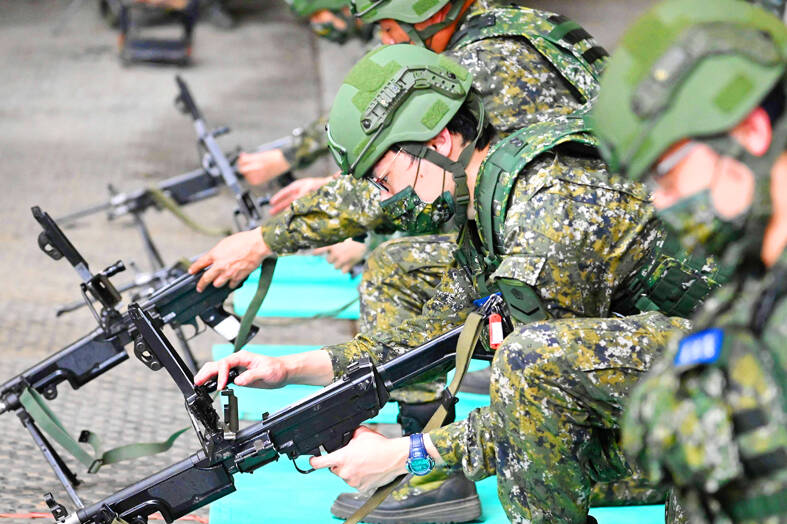Taiwanese armed forces must adapt their training and concepts to modern warfare, a military preparedness advocate said yesterday after a government report revealed that most reservists do not receive refresher training.
The All-Out Defense Mobilization Agency’s refresher training program has trained less than 35 percent of eligible reservists since its establishment in 2020, the Legislative Yuan’s Budget Center said in a recent report.
The Ministry of National Defense said the agency’s target is to establish five new training brigades and three reservist training centers to increase training capacity to 29,000 troops.

Photo: Sam Yeh, AFP
Asked for comment, Kuma Academy co-founder and chief executive officer Ho Cheng-hui (何澄輝) yesterday said that rapidly updating doctrine and techniques is crucial to maintaining military effectiveness amid constant technological change.
Traditional reservist training programs, which emphasize mobilization speed at the expense of giving troops training time, facilities and resources, have been rendered obsolete by sophisticated weapon systems and tactics, he said.
The culture in the nation’s armed forces sees little need to retrain reservists beyond physical training and basic marksmanship, but modern infantry standards have evolved to operating anti-tank guided missiles and other complex weapons systems, he said.
The nation’s basic and reservist training programs have not yet recognized the importance of effectively managing the flow of tactical information and conducting synchronized maneuvers across organizational lines, Ho said.
The military’s training program has neglected military education beyond urging troops to be mindful of the need for secrecy, which does not meet the demands of the modern informational environment, he said.
Traditional spying awareness education about guarding military secrets is insufficient when military secrets could be easily leaked by unguarded use of devices such as phones and smartwatches, he added.
A new basis for cultivating the nation’s will to resist the enemy and consciousness of the enemy is also needed due to changes in Taiwanese society and politics, he said.
The military’s avoidance of transitional justice reforms have contributed to the continued reliance on ideals and modes of thought that are unsuited for its modern role of being the guardians of democracy, he said.
The military curriculum from 10 years ago is at risk of becoming utterly irrelevant today, he said.

Chinese Nationalist Party (KMT) Chairman Eric Chu (朱立倫), spokeswoman Yang Chih-yu (楊智伃) and Legislator Hsieh Lung-chieh (謝龍介) would be summoned by police for questioning for leading an illegal assembly on Thursday evening last week, Minister of the Interior Liu Shyh-fang (劉世芳) said today. The three KMT officials led an assembly outside the Taipei City Prosecutors’ Office, a restricted area where public assembly is not allowed, protesting the questioning of several KMT staff and searches of KMT headquarters and offices in a recall petition forgery case. Chu, Yang and Hsieh are all suspected of contravening the Assembly and Parade Act (集會遊行法) by holding

PRAISE: Japanese visitor Takashi Kubota said the Taiwanese temple architecture images showcased in the AI Art Gallery were the most impressive displays he saw Taiwan does not have an official pavilion at the World Expo in Osaka, Japan, because of its diplomatic predicament, but the government-backed Tech World pavilion is drawing interest with its unique recreations of works by Taiwanese artists. The pavilion features an artificial intelligence (AI)-based art gallery showcasing works of famous Taiwanese artists from the Japanese colonial period using innovative technologies. Among its main simulated displays are Eastern gouache paintings by Chen Chin (陳進), Lin Yu-shan (林玉山) and Kuo Hsueh-hu (郭雪湖), who were the three young Taiwanese painters selected for the East Asian Painting exhibition in 1927. Gouache is a water-based

Taiwan would welcome the return of Honduras as a diplomatic ally if its next president decides to make such a move, Minister of Foreign Affairs Lin Chia-lung (林佳龍) said yesterday. “Of course, we would welcome Honduras if they want to restore diplomatic ties with Taiwan after their elections,” Lin said at a meeting of the legislature’s Foreign Affairs and National Defense Committee, when asked to comment on statements made by two of the three Honduran presidential candidates during the presidential campaign in the Central American country. Taiwan is paying close attention to the region as a whole in the wake of a

OFF-TARGET: More than 30,000 participants were expected to take part in the Games next month, but only 6,550 foreign and 19,400 Taiwanese athletes have registered Taipei city councilors yesterday blasted the organizers of next month’s World Masters Games over sudden timetable and venue changes, which they said have caused thousands of participants to back out of the international sporting event, among other organizational issues. They also cited visa delays and political interference by China as reasons many foreign athletes are requesting refunds for the event, to be held from May 17 to 30. Jointly organized by the Taipei and New Taipei City governments, the games have been rocked by numerous controversies since preparations began in 2020. Taipei City Councilor Lin Yen-feng (林延鳳) said yesterday that new measures by